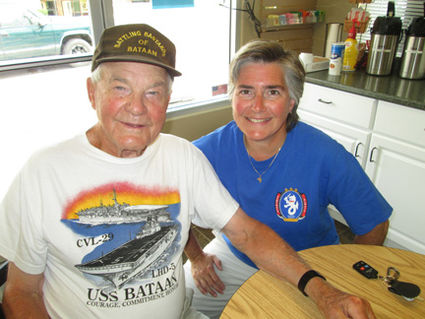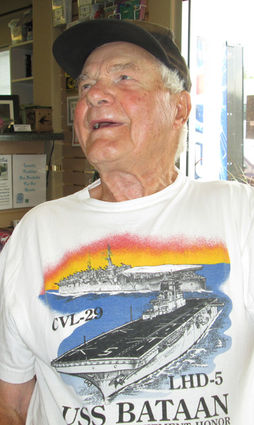Death march Veteran visits the coulee
Last updated 7/16/2014 at 9:45am

Dan Crowley and his wife, Kelley, were in Grand Coulee Monday, and were sidelined to hear the story of how he had been surrendered by military authorities. He is one of only a few Bataan/Corregidor veterans remaining. (Roger S. Lucas photo)
A veteran who "was surrendered" by Bataan military authorities to the Japanese in World War II, was a visitor to Grand Coulee Monday.
Dan Crowley, who enlisted in Hartford, Connecticut, in early January, 1941, reported to Ft. Slocum, N.Y., and shortly after found himself on a troop ship to the Philippines.
After being surrendered on Bataan, a small group of a couple hundred, decided to swim after dark the half mile to Corregidor, where they continued to fight for another month before "being surrendered" there, Crowley said.
His story, of a 42-month imprisonment by the Japanese, involved a number of marches and prison camps. It ended when news of the surrender reached him at a remote copper mine on one of the Japanese home islands.
His determination and luck helped him withstand grueling death marches where thousands of U.S. and Philippine military personnel died at the hands of the Japanese.
Crowley is 92 and still kicking. He credits red wine, dark chocolate and a new 49-year-old wife, Kelley, with his longevity.
Right now, he stated, "We are on a topless honeymoon tour of the United States." He gleefully refers to his red convertible Mustang that bears a number 1 license plate from the state of Connecticut.
Crowley had just completed a speech to a handful of U.S. and Philippine vets at a San Francisco venue who had suffered the same ordeals. "There's not many of us left," he said, referring to the Bataan Death March. He said that there had been one other survivor from Connecticut, and that was two years ago.

Dan Crowley entertains a number of veterans with his war stories from when he was a prisoner of war after members of the military command surrendered forces on Bataan and Corregidor.
Crowley survived march after march, and prisoner of war camps one after another.
At the worst of times, his and the others faced humiliation, mistreatment and often death.
Accordingly, he doesn't have anything nice to say about his captors.
At the copper mine, Crowley worked at least 12 hours a day, but was supervised by civilian Japanese. They were much "more humane," he said.
News of Japan's surrender came to him there by a Chinese man, also a prisoner, who was working for the Japanese.
Within a short time, Crowley was flown to Manila and then awaited a ship for the final voyage home.
When returned to the U.S., the army upped him one grade (to a corporal), and he got $400 compensation.
Crowley is doing everything he can to see that an accurate story is told about the treatment from the Japanese and the shortcomings of decisions made by the U.S. military.





Reader Comments(0)